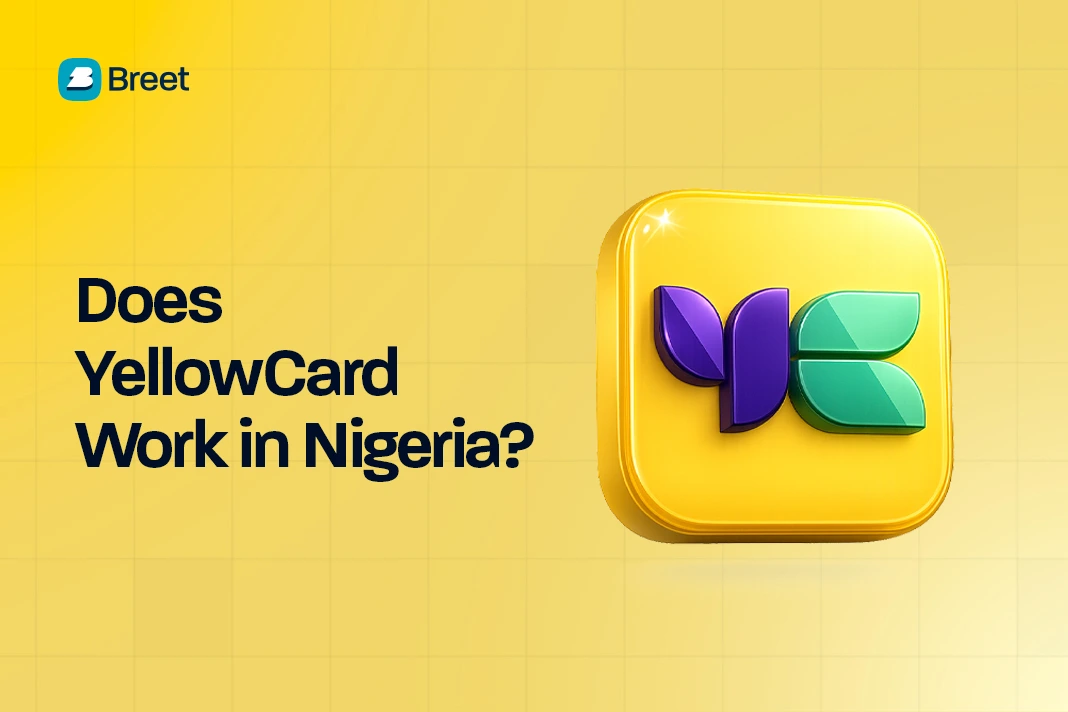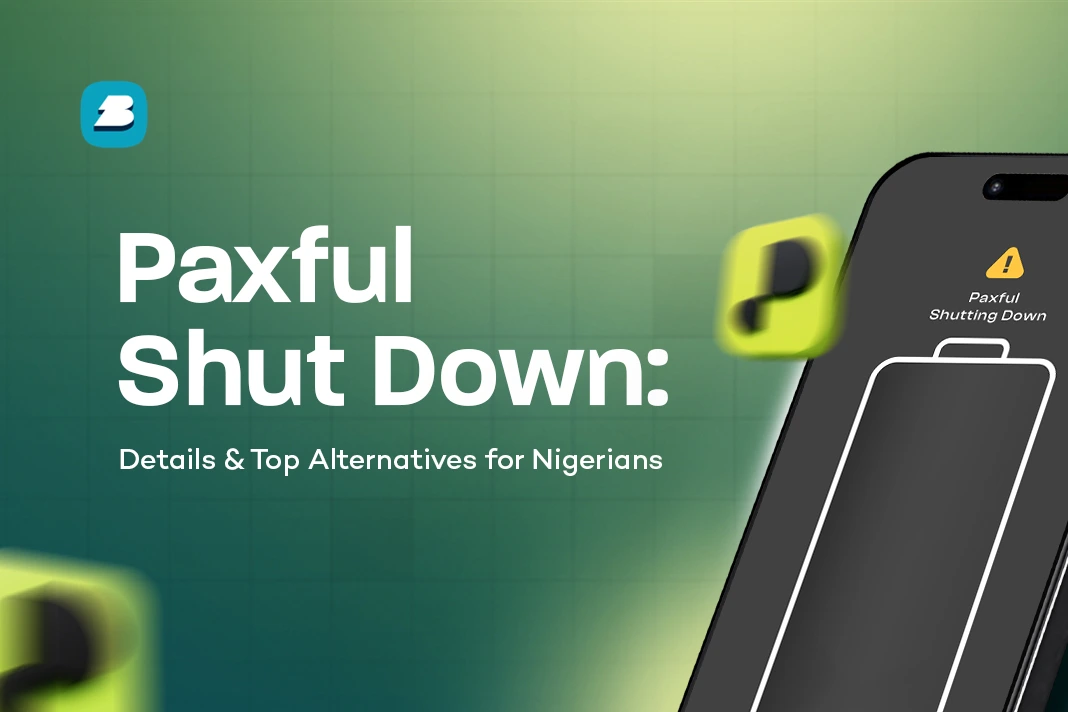Buying or selling crypto in Nigeria can sometimes feel confusing or risky, especially with so many platforms out there and stories of scams or failed transactions.
That’s exactly the problem crypto exchanges in Nigeria aim to solve. They make it easier, safer, and faster for people to trade digital currencies like Bitcoin, USDT, and Ethereum.
But with so many options now available, how do you know which one to use?
In this guide, we’ve ranked the best 13 Crypto Exchanges in Nigeria, looking at things like security, ease of use, fees, and more, to help you find the one that suits you best.
Are you’re a beginner or a seasoned trader? This list is for you.
Related:
Why Nigerians Use Crypto Exchanges
Crypto use has grown massively in Nigeria over the past few years.
With rising inflation, restrictions on international payments, and limited access to dollars, many Nigerians are turning to cryptocurrency as a smarter and faster alternative.
Crypto exchanges play a big role in this shift.
They help people easily buy, sell, and swap digital currencies like Bitcoin, Ethereum, and USDT.
Here are five common reasons Nigerians are using crypto exchanges today:
1. Buying and Selling Crypto Made Easy
Before exchanges, getting crypto in Nigeria was difficult and risky.
Now, platforms let you buy coins like Bitcoin or USDT in just a few clicks, either through bank transfers, cards, or P2P trades.
It makes the whole process simple and beginner-friendly.
2. Access to P2P (Peer-to-Peer) Trading
Many Nigerian exchanges offer P2P trading, which allows users to buy or sell crypto directly with other people, often in naira. This is especially useful when bank restrictions affect direct crypto payments.
With P2P, users can still trade freely and get cash instantly.
Top Pick:
- The Best 9 USDT Trading Platforms, Ranked
3. Stablecoins Like USDT for Protection Against Naira Devaluation
With the naira losing value over time, more people are saving money in stablecoins like USDT.
These digital dollars stay the same in value and protect users from inflation.
Crypto exchanges make it easy to convert naira to USDT and back when needed.
4. Sending and Receiving Money Across Borders
Traditional international transfers can be slow and expensive.
With crypto, Nigerians can send and receive money across the world in minutes, often with lower fees.
Exchanges make this process smooth by handling conversions between crypto and local currency.
5. Freelancing and Online Payments
A growing number of Nigerian freelancers and remote workers now get paid in crypto.
It’s faster and more reliable than bank wires. Exchanges help these users convert their crypto earnings into naira or spend them directly.
Related:
- Top 11 Crypto Exchanges in Ghana
What to Look for in a Good Crypto Exchange in Nigeria

With so many crypto exchanges in Nigeria, it can be hard to tell which ones are trustworthy and which ones to avoid.
Some platforms are fast and reliable, while others can be slow, expensive, or even unsafe.
If you’re new to crypto, or just looking to switch platforms, here are the key things you should always consider before choosing a crypto exchange in Nigeria:
1. Strong Security
Security should be your number one priority.
The best exchanges protect your funds with features like two-factor authentication (2FA), encryption, and cold storage (keeping crypto offline). You want a platform that puts your safety first and has no major history of hacks.
2. Low and Transparent Fees
Some exchanges charge high fees without being clear about it.
Look for platforms that are upfront about their fees, whether it’s for deposits, withdrawals, trading, or P2P transactions. Lower fees mean you keep more of your money when buying or selling crypto.
Related:
- The Best 9 Crypto Trading Platforms in Ghana
3. Naira Support and Payment Options
A good Nigerian exchange should let you deposit or withdraw in naira (₦). Bonus points if they support popular local methods like bank transfers, USSD, or even mobile money. This makes it easier to move your money in and out of crypto without stress.
4. Fast and Easy to Use
Whether you’re a beginner or pro, the exchange should be simple and fast. From signing up to making your first trade, the whole process should be smooth. A clean interface, quick verification, and fast transactions can make all the difference.
5. Helpful Customer Support
Things don’t always go as planned. So when you have a question or problem, you want support that actually responds. Choose exchanges with responsive customer service via chat, email, or even WhatsApp. Bonus if they have helpful FAQs or Nigerian-based support teams.
6. Regulated or Well-Established
While crypto is still lightly regulated in Nigeria, it helps to use platforms that are licensed in other countries or have a strong reputation. This adds a layer of trust and shows they’re committed to doing things right.
Choosing the right crypto exchange can save you time, money, and stress. In the next section, we’ll break down the best 13 Crypto Exchanges in Nigeria so you can find the one that fits your needs best.
Top 13 Crypto Exchanges in Nigeria (Ranked)

- Breet
- Binance
- KuCoin
- Luno
- Roqqu
- MEXC
- Bitmama
- OKX
- Busha
- Bitget
- Quidax
- Zengo
- NairaEX
1. Breet

Breet has quickly become one of the most popular crypto exchanges in Nigeria, especially for people who want to convert their crypto into naira without stress.
Unlike typical exchanges where you have to trade with other users or worry about market prices, Breet is an OTC trading platform (over-the-counter).
This means the platform handles the conversion for you directly, fast and automatically.
The process is simple. Once you send your crypto to your Breet wallet, the system instantly calculates the value and sends the naira equivalent straight to your bank account.
No need to find a buyer or wait for transactions to confirm manually.
This makes it a great choice for individuals, freelancers, or businesses who receive crypto and just want to cash out quickly.
Another thing users love is how easy the app is to use.
There are no complicated charts or trading features, just a clean interface that focuses on one thing: helping you sell crypto and get your money fast.
It’s also known for its reliable payouts, strong security measures like two-factor authentication, and responsive customer support.
On Breet, you can also swap crypto to crypto assets easily
Cons
Breet does have its limitations:
- You can’t buy crypto on the platform.
- It does not support peer-to-peer (P2P) trading.
So while it’s perfect for selling crypto, you’ll need another platform if you’re looking to buy coins or trade directly with other users.
2. Binance

Binance P2P is the largest crypto exchange in the world, and it’s also one of the most widely used in Nigeria.
It offers a wide range of features: spot trading, futures, staking, and especially P2P trading, which many Nigerians use to buy or sell crypto in naira.
The platform supports local payment methods and offers good rates, making it ideal for both beginners and advanced users.
Cons
Some common issues Nigerians face include:
- The platform can feel complex and overwhelming for first-timers.
- Occasional restrictions or delays with naira-related transactions.
- Customer support isn’t always fast or Nigeria-focused.
Related to Binance:
3. KuCoin

KuCoin P2P is another one of the global crypto exchanges in Nigeria.
It offers access to hundreds of cryptocurrencies, competitive trading fees, and a reliable P2P marketplace where Nigerians can trade directly using naira.
Many users also like its reward programs and trading tools for more experienced traders.
But there are a few downsides to note:
- The interface isn’t very beginner-friendly.
- No direct naira deposit. Users often have to rely on P2P.
- Limited local support or presence in Nigeria.
Others Liked:
- 15 Best Play to Earn (P2E) Games
4. Luno

Luno is one of the earliest crypto exchanges to enter the Nigerian market, and it remains a trusted choice for many.
Its clean, simple interface makes it easy for beginners to buy, sell, and store popular coins like Bitcoin and Ethereum using naira. It also supports direct bank deposits and withdrawals, which adds to its convenience.
Cons
Users should keep in mind:
- It offers a limited selection of cryptocurrencies.
- No P2P trading option. Only direct buy/sell at Luno’s set rates.
- Trading fees can be higher compared to other global platforms.
Related to Luno:
- Does Luno Still Work in Nigeria? A Review
5. Roqqu

Like Breet, Roqqu is one of the home-grown crypto exchanges in Nigeria that’s become a favorite for many in the country.
It supports a wide range of cryptocurrencies: Bitcoin, Ethereum, USDT, XRP, and more. It lets users easily deposit and withdraw naira via bank transfer or debit cards.
The interface is clean and beginner-friendly, with helpful features like automated payouts, bill payments, and beginner learning resources.
On top of that, it offers strong security through two-factor authentication, SSL encryption, and cold storage.
Recently, Roqqu even earned a virtual currency license in Europe, expanding its reach and showing growing regulatory trust
Cons
There are a few downsides worth noting:
- Withdrawal delays and poor customer service are common complaints
- The platform charges a flat 2% fee on transactions, which could be higher than other options
- Despite its wide crypto support, some users say fewer coins are actively tradable and certain withdrawal limits apply
Related to Roqqu:
- Roqqu vs Luno: Which is Better?
6. MEXC
MEXC is a global cryptocurrency exchange that has become increasingly popular with Nigerian traders thanks to its wide selection of assets, deep liquidity, and competitive fees.
It supports thousands of cryptocurrencies and provides advanced trading tools that appeal to both beginners and experienced users.
On MEXC, Nigerians can trade spot markets, access futures, participate in P2P trading with naira through vetted merchants, and even explore copy trading or grid bots for automated strategies.
The platform is known for low fees, often zero maker fees and very low taker fees, and a broad range of trading pairs.
Cons
Some challenges Nigerians may encounter include:
- Fiat on-ramping (NGN deposits via bank accounts) often depends on third-party providers, which can be less direct than fully integrated local banking options.
- The advanced feature set may feel overwhelming for complete beginners.
7. Bitmama

Bitmama is one of the new crypto exchanges in Nigeria that is ideal for users who want a straightforward platform to buy, sell, or hold popular cryptocurrencies like Bitcoin, Ethereum, and USDT.
It started as a peer-to-peer exchange but now lets you link your bank account for easy naira deposits and withdrawals, while also offering unique features like virtual crypto cards and loan-to-buy options.
Its app is beginner-friendly, with two-factor authentication and cold storage for added security.
Cons
- Bitmama has faced deposit delays and temporary service suspensions in the past, which frustrated some users when their funds didn’t reflect immediately (According to TechPoint Africa).
There have also been complaints about slow withdrawals and mixed customer support experiences
8. OKX

OKX is a major global crypto exchange known for its variety of trading options: spot, futures, staking, and even copy-trading.
Though many appreciated its extensive tools and low trading fees (~0.08% maker, ~0.1% taker), it proved to be a complex platform suited mainly for experienced traders.
However, regulatory pressure in Nigeria led OKX to disable its naira deposits and P2P functions earlier this year, and as of August 16, 2024, it halted all Nigerian user services except for withdrawals to comply with local restrictions.
Despite its global reputation and solid security measures, Nigerian users often found OKX’s interface overwhelming and its support slow or unhelpful especially when withdrawals were frozen or delayed .
However, since it no longer supports Nigerian naira, those looking for naira trading, P2P, or local customer care will need to explore other platforms.
Cons
- No naira deposits or P2P trading support.
- Services were officially discontinued for Nigerian users after August 2024.
- Complex interface and difficult navigation for beginners.
- Poor customer support; reports of delayed or blocked withdrawals.
Related to OKX:
- Does OKX Still Work in Nigeria? 2026 Update
9. Busha

Busha is one of the trusted home-grown crypto exchanges in Nigeria known for its beginner-friendly app and strong regulatory standing.
With direct naira deposits and withdrawals, low minimums (as little as ₦250), and no trading fees between fiat and crypto on the platform, it’s perfect for users looking to invest in major coins like Bitcoin, Ethereum, and USDT while keeping costs low.
They also offer features like automated recurring buys, limit orders, and a savings-like yield account offering up to 7.5–10% APY on stablecoins.
Cons
That said, Busha isn’t without its drawbacks.
- Several users have reported issues with delayed deposits or withdrawals, hidden pricing discrepancies, and occasional slow customer support that failed to resolve their concerns.
- While it holds a provisional virtual asset license from Nigeria’s SEC, which boosts its credibility.
- These operational hiccups mean you may sometimes face frustrating pauses during transactions.
Related to Busha:
- The Best 7 Busha Wallet Alternatives
10. Bitget

Bitget is a global crypto exchange popular among Nigerian traders seeking more advanced features.
It supports over 550 cryptocurrencies and offers a strong suite of tools, including spot trading, futures, margin, copy trading, and demo accounts.
The platform has low trading fees: 0.1% for spot and as low as 0.02% for futures maker orders.
Also users can get discounts by holding the native BGB token
Bitget also provides robust security with two-factor authentication, cold storage, Proof-of-Reserves reports, and a protection fund.
Cons for Nigerian users:
- No direct naira deposits. Funding must be done via stablecoins or P2P.
- Customer support has a mixed reputation; some Nigerian users mention slow or generic responses
- Withdrawal limits can be high, and some users have reported account freezes or disputes with holding funds.
- The interface may be overly complex for beginners focused on simple naira-crypto transactions.
Others Found this Helpful:
- 10 Best Bitcoin Transaction Accelerators
11. Quidax

Quidax stands out as Nigeria’s first SEC‑licensed crypto exchange, earning a provisional Digital Assets Exchange license in August 2024.
This was major step toward regulation and trust in the market.
It’s a user-friendly platform that lets Nigerians deposit and withdraw naira easily via bank transfers or vouchers, and it supports popular coins like Bitcoin, Ethereum, and USDT.
Many users praise its smooth transactions, especially for fiat on-ramp/off-ramp, calling it “easy and smooth” with “never delayed withdrawal”.
Quidax also offers educational content through Quidax Academy and has built-in OTC support for larger trades
Quidax is not perfect. Here are its cons for Nigerian users
- Some users have reported high and unpredictable fees, claiming inflated costs when buying crypto
- Customer support is limited, relying on email and web tickets with no WhatsApp or local helpline
- Despite being licensed, Quidax still has a modest selection of cryptocurrencies and lacks advanced trading features compared to global platforms
Related to Quidax:
- Top 7 Quidax Alternatives, Ranked
12. NairaEx
NairaEx is one of the earliest Nigerian crypto exchanges, built specifically for users who want to buy or sell crypto directly with naira.
The platform focuses on simplicity rather than advanced trading. Users can exchange Bitcoin and a few other cryptocurrencies for naira and receive funds directly into their Nigerian bank accounts.
NairaEx is popular among beginners and users who prefer a straightforward crypto-to-naira experience without dealing with complex trading interfaces.
Cons
Some common limitations include:
-
Limited cryptocurrency options compared to global exchanges.
-
No advanced trading features like futures or margin trading.
-
Rates may not always be the most competitive during high market volatility.
13. Zengo
Zengo is a self-custodial crypto wallet that Nigerians can use to buy, sell, store, and receive cryptocurrencies without managing private keys.
Unlike traditional exchanges, Zengo uses keyless security technology and partners with third-party providers to enable crypto purchases and sales. This makes it appealing to beginners who want strong security without the technical complexity of wallets.
Zengo supports popular cryptocurrencies and allows users in Nigeria to buy and sell crypto using supported payment methods, depending on availability from its partners.
Cons
Some drawbacks Nigerians may notice include:
- Not a full crypto exchange with P2P or advanced trading features.
- Fiat withdrawal options depend on third-party providers and may be limited.
- Less control over pricing compared to P2P-based platforms.
Compare the Top Crypto Exchanges in Nigeria
| Exchange | Ease of Use | Naira Support | Speed of Transaction | P2P Available | Can Buy Crypto | Best For |
|---|---|---|---|---|---|---|
| Breet | Very Easy | Yes (Bank payouts) | Very Fast (under 5 mins) | No | No (Sell-only platform) | Instant crypto-to-naira conversion |
| Binance | Moderate | Yes (via P2P) | Fast | Yes | Yes | P2P traders and advanced users |
| Luno | Very Easy | Yes (direct naira deposit) | Moderate | No | Yes | Crypto beginners |
| KuCoin | Moderate to Complex | Indirect (P2P only) | Fast (via P2P) | Yes | Yes | Experienced traders |
| Roqqu | Easy | Yes (Bank and card) | Fast | No | Yes | Nigerians who want local deposits & crypto variety |
Don’t Miss:
- Top Tips: How to Retrieve Stolen Bitcoin From Scammers
Choosing the Best Crypto Exchange in Nigeria for You
At the end of the day, there’s no one-size-fits-all crypto exchange. What works best for you depends on what you’re looking for.
If you just want to sell crypto fast and get naira in your bank account, Breet is one of the easiest and most reliable crypto exchanges in Nigeria right now. It’s especially great for freelancers, business owners, or anyone getting paid in crypto.
For those who want to trade regularly or use P2P, Binance and KuCoin offer more advanced tools and access to a wider range of coins. However, they may feel a bit overwhelming if you’re new to crypto.
If you’re a beginner who wants a simple, trusted place to buy and hold crypto, are solid choices, with easy interfaces and direct naira support.
The best move? Start with 1 or 2 platforms that match your goals, test them out, and see which one fits your style and comfort level.
As crypto grows in Nigeria, having the right exchange in your corner can make all the difference.






